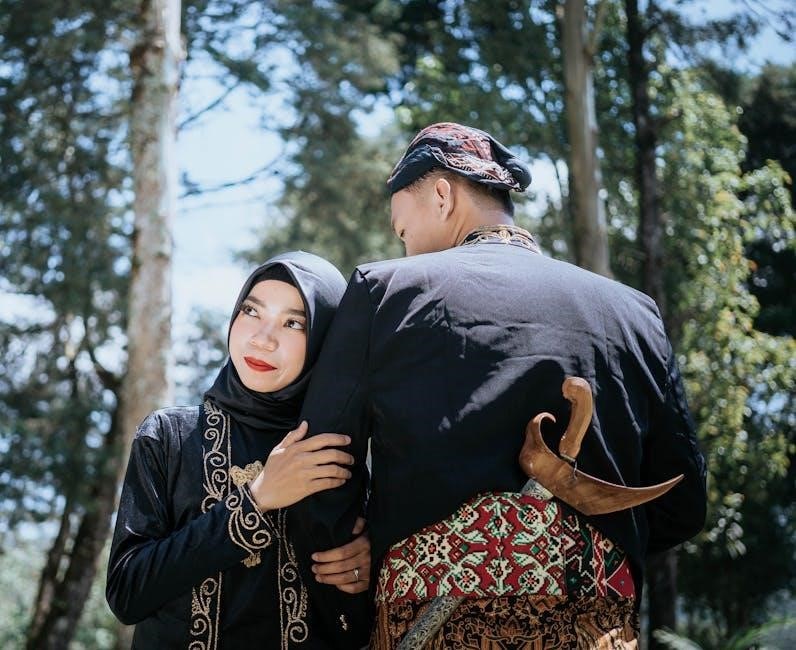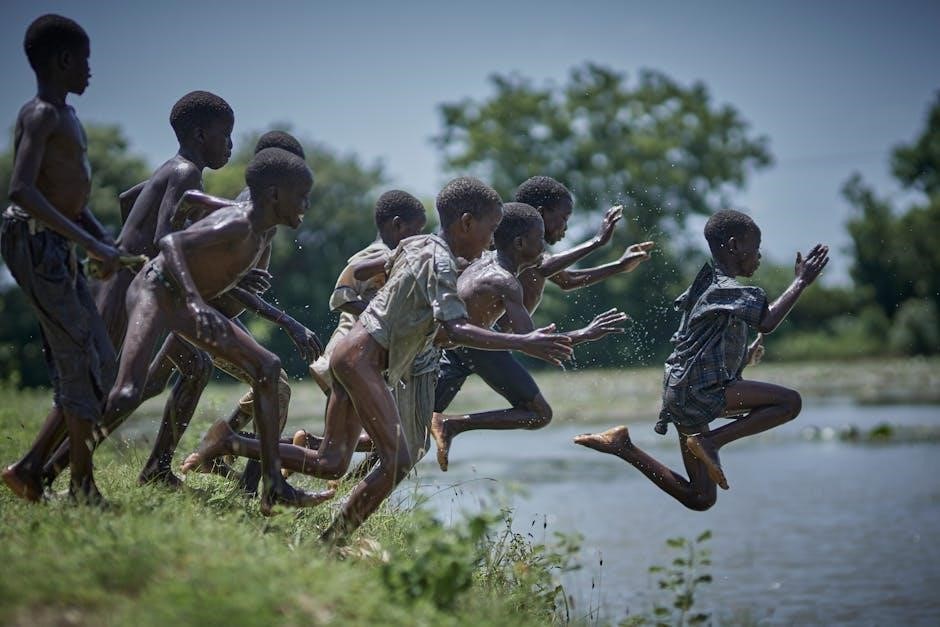
magnus chase and the sword of summer pdf
Magnus Chase and the Sword of Summer is the first book in Rick Riordan’s series‚ introducing Magnus‚ a homeless teen who discovers his Norse heritage and embarks on a quest to prevent Ragnarok‚ blending mythology with modern adventure.
1.1 Overview of the Book
Magnus Chase and the Sword of Summer follows Magnus‚ a homeless teen who discovers he’s the son of a Norse god. After his death‚ he enters the Norse afterlife and embarks on a quest to retrieve the Sword of Summer to prevent Ragnarok. The book blends Norse mythology with modern-day Boston‚ showcasing Magnus’s journey from homelessness to heroism‚ filled with humor‚ action‚ and self-discovery.
1.2 Background of the Series
Magnus Chase and the Gods of Asgard is a trilogy by Rick Riordan‚ blending Norse mythology with modern-day adventures. The series follows Magnus Chase‚ a teen who discovers his divine heritage. Set in the same universe as Percy Jackson‚ it features gods‚ monsters‚ and quests‚ offering a fresh take on mythology with Riordan’s signature humor and character-driven storytelling.

Main Characters in the Book
Magnus Chase‚ a homeless teen turned Norse hero‚ joins forces with Randolph‚ his enigmatic uncle‚ and Samirah al-Abbas‚ his loyal friend‚ to battle gods and monsters.
2.1 Magnus Chase
Magnus Chase‚ a 16-year-old homeless boy‚ discovers he is the son of the Norse god Frey. His journey transforms him from a street survivor to a hero‚ embracing his divine heritage while battling gods and monsters to prevent Ragnarok. Magnus’s wit‚ bravery‚ and loyalty shine as he navigates a world of mythology‚ friendship‚ and self-discovery.
2.2 Randolph Chase
Randolph Chase‚ Magnus’s mysterious uncle‚ plays a pivotal role in revealing Magnus’s Norse heritage. With cryptic warnings and enigmatic guidance‚ Randolph pushes Magnus toward his destiny‚ navigating the complexities of family secrets and divine responsibilities. His actions are driven by loyalty and a hidden agenda‚ shaping Magnus’s journey and the fate of the Nine Worlds.
2.3 Samirah al-Abbas
Samirah al-Abbas is a powerful Valkyrie and Magnus’s closest ally. Her sharp wit‚ courage‚ and deep understanding of Norse mythology make her indispensable. As a skilled warrior‚ she helps Magnus navigate the challenges of his newfound identity and the impending threat of Ragnarok‚ while her loyalty and friendship provide emotional support during his journey.
Magnus Chase‚ a homeless teenager‚ faces a mysterious warning from Blitz‚ signaling danger. His life on Boston’s streets is disrupted‚ setting the stage for an ominous journey.
Magnus Chase’s world is one of struggle and survival. As a homeless teenager in Boston‚ he navigates the harsh streets‚ relying on wit and resourcefulness. His life is marked by isolation‚ yet he finds camaraderie with friends like Blitz and Hearth. The mysterious warning from Blitz signals a shift‚ introducing Magnus to a hidden realm of Norse mythology and impending danger.
3.2 The Warning from Blitz
Blitz‚ a nervous and disheveled man‚ delivers a cryptic warning to Magnus‚ stating that people are searching for him. This encounter marks a turning point‚ shifting Magnus’s focus from daily survival to unraveling the mysterious forces pursuing him‚ setting the stage for his journey into Norse mythology and adventure.
Themes Explored in the Novel
Identity‚ friendship‚ and survival are central themes‚ as Magnus navigates his Norse heritage and battles looming destiny. The story explores trust‚ loyalty‚ and self-discovery‚ resonating deeply with readers.
4.1 Identity and Destiny
Magnus’s journey explores his struggle to embrace his Norse heritage and divine lineage. As the son of Frey‚ he must accept his destiny to wield the Sword of Summer‚ navigating grief‚ trust‚ and self-discovery. His identity evolves from a homeless teen to a hero‚ highlighting the clash between his mortal past and his divine responsibilities‚ ultimately shaping his path to prevent Ragnarok.
4.2 Friendship and Loyalty
Magnus forms strong bonds with allies like Samirah and Blitz‚ who stand by him through trials. Their loyalty and trust prove crucial in his quest‚ emphasizing teamwork and sacrifice. These relationships highlight the power of camaraderie‚ as Magnus learns to rely on others‚ balancing his independence with the strength found in true friendship and shared purpose.
4.3 Survival and Trust
Magnus’s journey demands constant vigilance and strategic trust. He must rely on instincts and allies to survive treacherous encounters‚ learning to discern loyalty from deception. Trust becomes a double-edged sword‚ essential for success yet risky in a world filled with betrayals and hidden agendas‚ shaping Magnus’s ability to navigate life-or-death decisions with caution and resilience.

Character Background: Magnus Chase
Magnus Chase‚ a homeless teenager‚ discovers his Norse heritage as the son of Frey‚ transforming his life from street survival to a world of gods and destiny.
5.1 Life as a Homeless Teenager
Magnus Chase‚ a resourceful 16-year-old‚ has survived on Boston’s streets since his mother’s mysterious death. Living in shelters and parks‚ he relies on wit and courage‚ forming bonds with Blitz and Hearth. His homelessness shapes his identity‚ fostering resilience and a cautious trust in others‚ while grief and uncertainty linger.
5.2 Discovery of Norse Heritage
Magnus’s life shifts when he learns he’s the son of Frey‚ a Norse god‚ after his death and arrival in Valhalla. This revelation unveils his divine lineage‚ thrusting him into a world of gods‚ monsters‚ and prophecies. His heritage defines his destiny‚ tasking him with preventing Ragnarok and embracing his role as a demigod in Norse mythology.

Major Conflicts and Challenges
Magnus faces the quest for the Sword of Summer‚ battles powerful foes‚ and races to prevent Ragnarok. His journey demands courage‚ trust‚ and sacrifice to save the worlds.
6.1 The Quest for the Sword
Magnus must retrieve the Sword of Summer‚ a powerful artifact needed to prevent Ragnarok. His journey takes him across Norse realms‚ facing giants and monsters while uncovering his destiny as the son of Frey. The sword’s retrieval is crucial to maintaining balance and protecting the Nine Worlds from destruction.
6.2 Preventing Ragnarok
Magnus’s primary mission is to prevent Ragnarok‚ the Norse apocalypse‚ by ensuring the Sword of Summer remains out of the wrong hands. His journey is fraught with challenges as he battles giants and monsters‚ while also navigating the complexities of his destiny. The stakes are high‚ as failure could lead to the destruction of the Nine Worlds‚ forcing Magnus to confront his fears and grow into his role as a hero.

Foreshadowing in the Story
The Fates’ warning to Magnus and hints about his ultimate sacrifice subtly foreshadow key events‚ preparing readers for the story’s dramatic twists and Magnus’s destined role.
7.1 The Fate’s Warning
The Fates’ enigmatic warning to Magnus in the dining hall of Valhalla hints at his crucial role in preventing Ragnarok. Their cryptic message about a hero Valhalla cannot contain foreshadows Magnus’s ultimate sacrifice and the challenges he will face‚ emphasizing the gravity of his destiny and the impending battle against the forces of chaos.
7.2 Magnus’s Ultimate Sacrifice
Magnus’s ultimate sacrifice is a pivotal moment‚ as he gives his life to prevent the early onset of Ragnarok. His death marks a turning point‚ propelling him into the Norse afterlife of Valhalla. This act of bravery underscores his commitment to destiny and sets the stage for his journey to embrace his divine heritage and confront the forces of chaos threatening the worlds.

Norse Mythology Elements
Norse Mythology Elements are central to the story‚ featuring the Nine Worlds‚ gods like Thor and Frey‚ and mythical creatures. These elements enrich the narrative‚ blending traditional myths with modern-day challenges faced by Magnus and his companions‚ creating a unique and immersive world for readers to explore.
8.1 The Nine Worlds
The Nine Worlds of Norse mythology are central to the story‚ connected by Yggdrasil‚ the World Tree. These realms‚ including Asgard‚ Midgard‚ and Helheim‚ represent diverse domains of gods‚ humans‚ and other beings. Magnus’s journey through these worlds highlights their significance and interconnectedness‚ showcasing Norse cosmology while enriching the narrative with mythological depth and adventure.
8.2 Gods and Monsters
The story features a variety of Norse gods and monsters‚ each with distinct roles. Gods like Frey‚ Thor‚ and Loki shape the narrative‚ while monsters such as Fenris Wolf and Surt pose significant threats. These characters‚ rooted in Norse mythology‚ add depth and complexity to Magnus’s journey‚ highlighting the clash between divine power and mortal courage in a rich‚ immersive world.

Literary Devices and Style
Rick Riordan’s engaging style in Magnus Chase combines humor and sarcasm‚ creating a relatable narrative voice that draws readers into the Norse mythological world with ease.
9.1 First-Person Narration
The novel is narrated by Magnus Chase‚ offering a personal and intimate perspective of his journey; This narrative style allows readers to deeply connect with Magnus’s thoughts‚ emotions‚ and growth‚ making his transformation from a homeless teen to a hero feel authentic and immersive.
9.2 Humor and Sarcasm
Rick Riordan infuses the story with Magnus’s witty remarks and sarcastic humor‚ providing comic relief even in tense moments. This tone not only makes the character relatable but also lightens the mood‚ balancing the darker themes of Norse mythology and impending doom with engaging and entertaining dialogue.

Book Reviews and Reception
The Sword of Summer received widespread critical acclaim for its humor and character development. Readers praised Magnus’s journey‚ earning it the Goodreads Choice Award; Fans loved the new characters and mythological depth‚ solidifying its place in Rick Riordan’s legacy.
10;1 Critical Acclaim
The Sword of Summer garnered widespread critical acclaim for its engaging narrative and humor. Critics praised Rick Riordan’s ability to blend Norse mythology with modern-day challenges. The book won the Goodreads Choice Award for Best Middle Grade & Children’s in 2015‚ solidifying its place as a standout in young adult fantasy. Fans and reviewers alike celebrated its relatable characters and gripping plot twists.
10.2 Reader Feedback
Readers praised Magnus Chase and the Sword of Summer for its humor‚ lovable characters‚ and fresh take on Norse mythology. Magnus’s sarcastic wit and relatable struggles resonated deeply. Fans appreciated the blend of action‚ heart‚ and mythological twists‚ making it a favorite among those who enjoyed Riordan’s previous series. The book’s ability to balance light-hearted moments with epic stakes earned it a special place in many readers’ hearts.

Comparison with Percy Jackson Series
Rick Riordan’s Magnus Chase shares a similar tone and style with Percy Jackson‚ blending humor with mythology. Both series feature relatable heroes navigating mythological worlds‚ though Magnus explores Norse mythology‚ offering a fresh yet familiar adventure for fans of Riordan’s earlier work.
11.1 Similar Themes
Both series explore themes of identity‚ destiny‚ and friendship‚ with protagonists navigating mythological worlds. Humor‚ relatable protagonists‚ and self-discovery are central to both‚ appealing to fans of adventure and mythology. The struggle between fate and personal choice is a common thread‚ making the themes universally resonant and engaging for readers of all ages.
11.2 Different Mythological Contexts
While Percy Jackson delves into Greek mythology‚ Magnus Chase immerses itself in Norse myths‚ introducing gods like Odin and Thor. The Nine Worlds and concepts like Ragnarok create a distinct setting‚ contrasting with the Olympian realm. This shift offers fresh lore and cultural depth‚ appealing to readers seeking new mythological adventures and diverse storytelling.
Symbolism and Hidden Meanings
The Sword of Summer symbolizes power and destiny‚ while Magnus’s journey reflects self-discovery and acceptance of his divine heritage‚ blending Norse mythology with personal growth themes.
12.1 The Sword of Summer
The Sword of Summer‚ a central symbol‚ represents Magnus’s inherited power and destiny. It embodies the legacy of his father‚ Frey‚ the god of summer‚ and serves as a tool to prevent Ragnarok. The sword’s retrieval and mastery are pivotal to Magnus’s growth‚ signifying his acceptance of his divine identity and responsibilities.
12.2 The Afterlife in Norse Mythology
The Norse afterlife‚ as depicted in the novel‚ is a complex system of realms‚ each serving a distinct purpose. Valhalla‚ the hall of fallen warriors‚ and Hel‚ the realm of those who didn’t die heroically‚ are central to Magnus’s journey. These realms highlight themes of mortality‚ heroism‚ and redemption‚ shaping Magnus’s understanding of his destiny and the world he now inhabits.
Magnus Chase and the Sword of Summer masterfully blends Norse mythology with modern adventure‚ leaving readers eager for future installments and reflecting on themes of identity and destiny.
13.1 Impact of the Book
The Sword of Summer has captivated readers with its unique blend of Norse mythology and modern humor‚ earning critical acclaim and winning the Goodreads Choice Award. Its themes of identity‚ loyalty‚ and self-discovery resonate deeply‚ making it a standout in young adult literature and solidifying its place as a fan favorite in Rick Riordan’s expansive universe.
13.2 Future Prospects for the Series
Magnus Chase and the Sword of Summer sets the stage for a compelling series‚ with future books promising to delve deeper into Norse mythology. The success of the first installment‚ coupled with Rick Riordan’s signature storytelling‚ ensures that the series will continue to captivate readers‚ expanding the universe and introducing new adventures for Magnus and his companions.